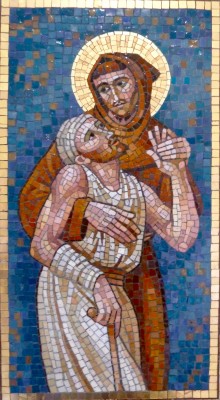Riding along quietly, perhaps daydreaming in the warm Umbrian sunshine, Francis suddenly reined his horse to a standstill. He was in shock. There, right in his path, stood a leper.  In his novel on the life of St. Francis of Assisi, Felix Timmermans describes what happens next:
In his novel on the life of St. Francis of Assisi, Felix Timmermans describes what happens next:
Francis felt his hair standing on end from horror. Fear of infection gripped his throat. He quickly gave his horse the spurs and galloped away. He did not dare to look back. His hat fell off, but he paid no attention. Yet as he rode on, he remembered the message of Christ’s gospel: despise all that you formerly desired, and cherish all that you formerly despised.
Then he said to himself, “You actor! You are moved to tears when you read the gospel—but when you meet someone whose suffering is the truest continuation on this earth of our Lord’s Passion, you are so selfish that you run away!”
He felt intensely ashamed of himself. So that was the kind of knight he was! Suddenly he turned his horse around and rode back. The leper was still standing there. His stench nearly made Francis faint. Nevertheless, he dismounted and bowed to this man in whom he saw an image of Jesus Christ in all his sufferings. All concern for his own life had vanished. All he felt was love. And he kissed the man on his cleft lips.[1]
Francis’ encounter with the leper is one of the most provocative and challenging stories from our heroic elder brothers and sisters, the saints. Very early still in his surrender to the love of God, he experienced the demand that divine love gently makes: what the beloved disciple receives must be freely given away. We catechists frequently propose intimacy with Christ to our learners, but what are the consequences, the demands, of such divine intimacy? Such a gift is always accompanied by a call to mission. We have been made for the very highest of activities—to participate, by grace, in divine, self-emptying love. When our finite, limited, sometimes wounded ability to love encounters the love of God, our capacities for self-gift are gradually healed, ennobled, and transfigured. Joined to Christ, the sap of the Vine begins to flow into the branches. Bishop Robert Barron writes, “To have faith is to allow oneself to be overwhelmed by the power of God, to permit the divine energy to reign at all levels of one’s being. As such, it is not primarily a matter of understanding and assenting to propositions as it is surrendering to the God who wants to become incarnate in us.”[2] The Christian disciple understands that baptism initiates a communion with Christ that is so real, that not only is Christ’s sonship in the Father ours (through adoption), but his mission is also to be personally embraced. Christ Jesus is Priest, Prophet, and King; and so are we by virtue of our very real union with him. As the Second Vatican Council teaches us, “From the fact of their union with Christ the head flows the laity’s right and duty to be apostles. Inserted as they are in the Mystical Body of Christ by baptism and strengthened by the power of the Holy Spirit in confirmation, it is by the Lord himself that they are assigned to the apostolate…”[3] The true disciple discovers this vocation to radical self-donation and cooperates with the One who is Love, so that the love of God comes to impact all relationships—with family, friends, enemies, and also with those who, like Francis and the leper, we have grown accustomed to ignore. Pope Francis describes it this way, “The more that you unite yourself to Christ and he becomes the center of your life, the more he leads you out of yourself, leads you from making yourself the center and opens you to others.”[4] Life in Christ, therefore, is distinguished always by these two yearnings: a desire for encounter with God and a longing to express the implications of that divine encounter by generously loving others. These two movements shape the life of the missionary disciple. Dr. James Pauley is Associate Professor of Theology and Catechetics at Franciscan University of Steubenville. He is author of Liturgical Catechesis in the 21st Century: A School of Discipleship, being published by Liturgy Training Publications in July 2017 .
Notes
